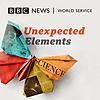
Unexpected Elements
BBC World Service
Categories: Science & Medicine
Add to My List
Listen to the last episode:
The sight of horses running wild in a city leads panellist Tristan Ahtone in Helsinki to rethink how we rate horses' welfare, Chhavi Sachdev in Mumbai tells the story of the country that is cloning the Lionel Messi of horses for sport and presenter Marnie Chesterton finds out why roboticist Eakta Jain is studying horses to engineer better relationships between humans and autonomous vehicles. All that, plus the slippery record for the world's biggest snake, how the alphabet came to be and asteroid forcing scientists to reiterate 'it will not hit Earth'.
Previous episodes
-
440 - Horsey driverless cars and competitive cloningFri, 03 May 2024
-
439 - A scientific séanceFri, 26 Apr 2024
-
438 - Computer memories and quantum futuresFri, 19 Apr 2024
-
437 - Beyoncé, banjos and dancing chemistryFri, 12 Apr 2024
-
436 - Unexpected electionsFri, 05 Apr 2024
-
435 - G.O.A.TThu, 28 Mar 2024
-
434 - Ancient water, modern solutionsThu, 21 Mar 2024
-
433 - Fandom: The next generationThu, 14 Mar 2024
-
432 - Unexpected OscarsThu, 07 Mar 2024
-
431 - Leaping in SyncThu, 29 Feb 2024
-
430 - Going the distanceThu, 22 Feb 2024
-
429 - Not so random acts of kindnessThu, 15 Feb 2024
-
428 - Deep in thoughtThu, 08 Feb 2024
-
427 - How plankton made mountainsThu, 01 Feb 2024
-
426 - Populations of people, frogs and microbesThu, 25 Jan 2024
-
425 - Rulers and the rules of ageingThu, 18 Jan 2024
-
424 - Super corals and science diplomacyThu, 11 Jan 2024
-
423 - Timing is everythingThu, 04 Jan 2024
-
422 - The Best of Unexpected ElementsThu, 28 Dec 2023
-
421 - A very dark dayThu, 21 Dec 2023
-
420 - An exploration of empathyThu, 14 Dec 2023
-
419 - Boring scienceThu, 07 Dec 2023
-
418 - Meetings with intelligent wormsThu, 30 Nov 2023
-
417 - All about cricket(s)Thu, 23 Nov 2023
-
416 - Why we need to talk toiletsThu, 16 Nov 2023
-
415 - Working 70 hours a weekThu, 09 Nov 2023
-
414 - Scary scienceThu, 02 Nov 2023
-
413 - Fashion to dye forThu, 26 Oct 2023
-
412 - Putting Madonna to the testThu, 19 Oct 2023
-
411 - How bedbugs took over the worldThu, 12 Oct 2023
-
410 - Complete shutdownThu, 05 Oct 2023
-
409 - How inflation affects the entire cosmosThu, 28 Sep 2023
-
408 - Can technology read our mind?Thu, 21 Sep 2023
-
407 - Forgetful fish, telescopic worms and bad air daysThu, 14 Sep 2023
-
406 - Zombies, cows and coupsThu, 07 Sep 2023
-
405 - Protecting the MoonThu, 31 Aug 2023
-
404 - The man who couldn’t lieThu, 24 Aug 2023
-
403 - Corrupted thinking and cancerous co-optionThu, 17 Aug 2023
-
402 - Some of our universe is missingThu, 10 Aug 2023
-
401 - The World Cup and hallucinogenic bananasThu, 03 Aug 2023
-
400 - Password1234#Invisibility&MoonshotThu, 27 Jul 2023
-
399 - Barbie in SpaceThu, 20 Jul 2023
-
398 - Nato and the left-handed universeThu, 13 Jul 2023
-
397 - Unexpected elements on the sea bedThu, 06 Jul 2023
-
396 - Predictions from the sky and murderous fishThu, 29 Jun 2023
-
395 - Hayfever, paleobotany and snot palacesThu, 22 Jun 2023
-
394 - Wildfires and wild animalsThu, 15 Jun 2023
-
393 - Collapsing pensions and civilisationsThu, 08 Jun 2023
-
392 - Migrate ideasThu, 01 Jun 2023
-
391 - Signals, seaweed and spaceThu, 25 May 2023
Show more episodes
5























